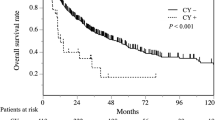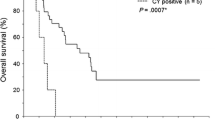Abstract
Background
The clinical implications of peritoneal lavage cytology (CY) status in patients with potentially resectable pancreatic cancer have not been established.
Method
We retrospectively reviewed clinical data from 254 consecutive patients who underwent macroscopically curative resection for pancreatic cancer from February 2003 to December 2010 in our institution. Correlations between CY status and survival and clinicopathological findings were investigated.
Results
Of the 254 patients, 20 were CY+ (7.9 %). There were no significant differences between CY+ and CY− patients in background data (age, sex, the level of preoperative tumor marker, and adjuvant chemotherapy). Patients with positive serosal invasion were more likely to be CY+ than those with negative serosal invasion (P < 0.001) by univariate analysis. The median overall survival of CY+ patients and CY− patients was 23.8 months (95 % CI = 17.6–29.8) and 26.5 months (95 % CI = 20.7–32.3), respectively (P = 0.302). The median recurrence-free survival of CY+ and CY− patients was 8.1 months (95 % CI = 0.0–17.9) and 13.5 months (95 % CI = 11.5–15.5), respectively (P = 0.089).
Conclusion
CY+ status without other distant metastasis does not necessarily preclude resection in patients with pancreatic cancer.

Similar content being viewed by others
References
Siegel R, Ward E, Brawley O, Jemal A (2011) Cancer statistics, 2011: the impact of eliminating socioeconomic and racial disparities on premature cancer deaths. CA Cancer J Clin 61:212–236
Gillen S, Schuster T, Meyer Zum Buschenfelde C et al (2010) Preoperative/neoadjuvant therapy in pancreatic cancer: a systematic review and meta-analysis of response and resection percentages. PLoS Med 7:e1000267
Aletti GD, Gallenberg MM, Cliby WA et al (2007) Current management strategies for ovarian cancer. Mayo Clin Proc 82:751–770
Japanese Gastric Cancer Association (2011) Japanese classification of gastric carcinoma: 3rd English edition. Gastric Cancer 14:101–112
American Joint Committee on Cancer (2010) Exocrine and endocrine pancreas. In: The AJCC Cancer Staging Manual, 7th ed. Springer, New York, pp 241–249
Clark CJ, Traverso LW (2010) Positive peritoneal lavage cytology is a predictor of worse survival in locally advanced pancreatic cancer. Am J Surg 199:657–662
Fernandez-del Castillo C, Rattner DW, Warshaw AL (1995) Further experience with laparoscopy and peritoneal cytology in the staging of pancreatic cancer. Br J Surg 82:1127–1129
Jimenez RE, Warshaw AL, Fernandez-Del Castillo C (2000) Laparoscopy and peritoneal cytology in the staging of pancreatic cancer. J Hepatobiliary Pancreat Surg 7:15–20
Leach SD, Rose JA, Lowy AM et al (1995) Significance of peritoneal cytology in patients with potentially resectable adenocarcinoma of the pancreatic head. Surgery 118:472–478
Makary MA, Warshaw AL, Centeno BA et al (1998) Implications of peritoneal cytology for pancreatic cancer management. Arch Surg 133:361–365
Merchant NB, Conlon KC, Saigo P et al (1999) Positive peritoneal cytology predicts unresectability of pancreatic adenocarcinoma. J Am Coll Surg 188:421–426
Meszoely IM, Lee JS, Watson JC et al (2004) Peritoneal cytology in patients with potentially resectable adenocarcinoma of the pancreas. Am Surg 70:208–213 discussion 213–204
Nakao A, Fujii T, Sugimoto H et al (2006) Oncological problems in pancreatic cancer surgery. World J Gastroenterol 12:4466–4472
Warshaw AL (1991) Implications of peritoneal cytology for staging of early pancreatic cancer. Am J Surg 161:26–29 discussion 29–30
Yachida S, Fukushima N, Sakamoto M et al (2002) Implications of peritoneal washing cytology in patients with potentially resectable pancreatic cancer. Br J Surg 89:573–578
Yamada S, Takeda S, Fujii T et al (2007) Clinical implications of peritoneal cytology in potentially resectable pancreatic cancer: positive peritoneal cytology may not confer an adverse prognosis. Ann Surg 246:254–258
Ueno H, Kosuge T, Matsuyama Y et al (2009) A randomised phase III trial comparing gemcitabine with surgery-only in patients with resected pancreatic cancer: Japanese Study Group of Adjuvant Therapy for Pancreatic Cancer. Br J Cancer 101:908–915
Tempero MA, Arnoletti JP, Behrman S et al (2010) Pancreatic adenocarcinoma. J Natl Compr Cancer Netw 8:972–1017
Ferrone CR, Haas B, Tang L et al (2006) The influence of positive peritoneal cytology on survival in patients with pancreatic adenocarcinoma. J Gastrointest Surg 10:1347–1353
Conroy T, Desseigne F, Ychou M et al (2011) FOLFIRINOX versus gemcitabine for metastatic pancreatic cancer. N Engl J Med 364:1817–1825
Katz MH, Pisters PW, Evans DB et al (2008) Borderline resectable pancreatic cancer: the importance of this emerging stage of disease. J Am Coll Surg 206:833–846 discussion 846–838
Acknowledgments
This study was supported by a grant-in-aid for cancer research from the Ministry of Health, Welfare and Labor of Japan and by the Japanese Foundation for Promotion of Cancer Research.
Conflict of interest
The authors declare no personal conflict of interest and no financial support for the study.
Author information
Authors and Affiliations
Corresponding author
Rights and permissions
About this article
Cite this article
Yoshioka, R., Saiura, A., Koga, R. et al. The Implications of Positive Peritoneal Lavage Cytology in Potentially Resectable Pancreatic Cancer. World J Surg 36, 2187–2191 (2012). https://doi.org/10.1007/s00268-012-1622-0
Published:
Issue Date:
DOI: https://doi.org/10.1007/s00268-012-1622-0




